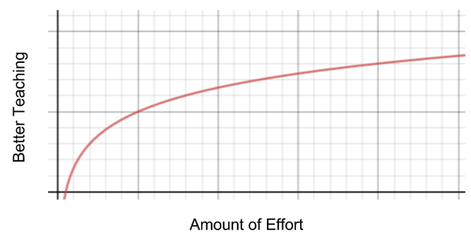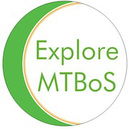Sure, I've picked up pieces here and there but I've not taken the time to get good at it. You know what I mean right? There's a difference between knowing how to cook and knowing how to cook. My family doesn't complain when I cook dinner. I know how to cook. But neither do they celebrate when I cook like they do when Grandma cooks. There is passable and then there is... another level entirely.
Here's the problem: though I want to be a better teacher, it's really, really hard. It feels like the amount of work necessary to keep upping my game increases with each next step. Kind of like this:
Here's the rough idea I'm currently working with:
Throughout the year, I would like to implement various forms of formative assessment in my classroom. Though the plan is just starting to take shape, my current thinking is that I would implement/sample new assessment tools every few weeks to a month. Each month I would then reflect on the implementation and on any evidence-based outcomes I can see in my classroom. Then my support team would help me evaluate the tool--how I might change my implementation and whether to continue using the tool in my classroom.
I would like to explore some of the areas underneath the rather large umbrella of formative assessment. Particularly, I’m thinking of standards-based grading (SBG). Many of my online math colleagues have already made this jump. And they’ve written about the process. Jumping both feet into SBG seems like too much for next year. However, I think I can realistically pick one unit and implement it in that unit. After I have the experience of doing SBG for an entire unit, I would like to talk to the math department about aligning one or our assessments with the course objectives for a single unit.
I don’t yet know the specific new skills or instructional practices I plan to demonstrate. What I do plan to do is immerse myself in formative assessment. I plan to make mistakes. I plan to be frustrated. I plan to fail forward. As with all new things, the more I do it the more I will know what works and what doesn’t in my classroom.
As the process unfolds, I expect to develop a list of different assessment practices, how I’ve attempted to incorporate them into my classroom, and my reflections on whether the energy-of-implementation-to-outcome ratio is worthwhile.
Action steps:
- Read everything I can get my hands on. I asked around and have quite a list of suggested reading from colleagues at my school and online:
- Embedded Formative Assessment by William and Leahy
- Inside the Black Box by William
- Competency Works
- Grading Smarter not Harder by https://twitter.com/myrondueck
- If planning on doing SBG,
- Blog posts by Robin Mathews
- Lisa Bejarno suggested using a ‘synthesis’ category once per unit to help students not think of math as a checklist of different skills.
- There is a wealth of blog posts by the #MTBoS crew
- Differential Assessment and Grading by Wormeli
- How to Grade for Learning K-12 by O'Connor
- Pathways to Proficiency--implementing evidence-based grading by Gobble, Onuscheck, Reibel, and some other guy.
- Fair isn't always Equal by Rick Wormeli
- Leverage relationships with math colleagues in and outside of BVSD to find people’s classrooms to visit.
- Pick nine formative assessment tools I want to attempt to implement in my classroom (this includes the SBG unit).
- I would like to implement one tool every month. I think the tools will present themselves as I become more versed in the subject.
- Implement formative assessment tools.
- Implement for an entire month before making any decisions regarding my comfort level with tool or how effective I think it is.
- Written reflection each month regarding the new tool.
- If the tool works well, I plan to continue implementation for the entire year.
- Standards-based grading
- Choose which unit to implement standards-based grading.
- Start the process of breaking down my unit into standards and aligning my assessment with those standards.
- Sink or swim
- Reflect on the process.
- Blog writing
- Bouncing ideas off my department members
- Hopefully, through a larger support community

 RSS Feed
RSS Feed



